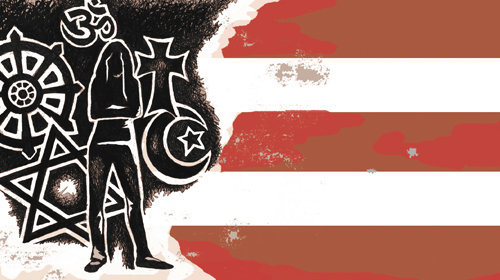Here’s a trial lawyer bill the Republican Party can get behind!
Author’s note: This post has been altered from its original version to correct an error.
At last we have an answer to the question: What would it take to get a Republican to support trial lawyers, attorneys fees and creating a brand new right to sue?
That answer: when it comes to prayer in schools, of course!
Assemblyman Jim Wheeler, R-Minden, is the primary sponsor of Assembly Bill 120, which ostensibly aims to “clarify” the rights of pupils at public schools in Nevada with respect to religious freedom. And while Wheeler maintained at a hearing before the Assembly Education Committee today that the bill buttresses fundamental constitutional rights, critics found more than a few things to dislike about it.
For example, it allows students to “…speak, or otherwise express a religious viewpoint, including, without limitation, express a religious viewpoint in school work, to the same extent and under the same circumstances as each pupil is allowed to speak or otherwise express a viewpoint on a non-religious matter.”
Not only that, but it allows students to “possess or distribute religious literature to the same extent and under the same circumstances as each pupil is allowed to possess or distribute literature on a non-religious matter.”
Oh, and students will be allowed to organize or participate in a prayer group, religious club or any other religious gathering before, during and after school.
What’s the issue, you ask? Well, the first issue is this: Students who attend the public schools aren’t supposed to be speaking or distributing literature on religious matters in the first place! That’s especially true during the school day, when they are compelled by law to attend classes, and are thus a captive audience. And allowing students to preach to their captive-audience classmates would be considered a violation of the Establishment Clause of the First Amendment to the Constitution of the United States.
(Don’t take my fake-lawyer word for it, either: That comes from Vanessa Spinazola, lobbyist for the ACLU of Nevada, a graduate of Loyola University of New Orleans law school, one of several witnesses against the bill.)
Want more? Students who think their rights have been violated can complain to the principal, to the school board and, if still unsatisfied, can sue in District Court. If they’re successful, they get $10,000 and their lawyer gets his or her fees paid!
A vague law capable of subjective interpretation, attorneys fees and the prospect of a $10,000 award from a deep-pocketed government agency? What could possibly go wrong?
Just last week, state Sen. Greg Brower took to the Senate floor to decry construction defect lawyers for allegedly exploiting the system, for earning billions in fees in lawsuits against builders. This, Brower said, was a Very. Bad. Thing, and required immediate reform. But now, one of Brower’s Republican colleagues in the Assembly is seeking to take a big Pink Pearl eraser to the line separating church and school, creating a brand-new cause of action and a potential lawyer’s bonanza in the process?
Which is it, folks?
(Correct answer: Attorneys fees are appropriate when an actual wrong has occurred. Since schools are prohibited by the First Amendment — as well as the Nevada Constitution — from engaging in sectarian education, and since allowing inherently religious speech or distribution of literature in a captive-audience situation would violate those provisions — no actual wrongs take place when administrators and teachers keep instruction time non-religious. In fact, that’s part of their job.)
Although the bill faced some good questions from Democrats on the committee, and some good objections were made by opponents during testimony, it’s not entirely clear AB 120 will be ignored as not ready for prime time in a constitutional republic. But it really should be.
UPDATE: Review-Journal reporter Sean Whaley’s report on the hearing is here.






















